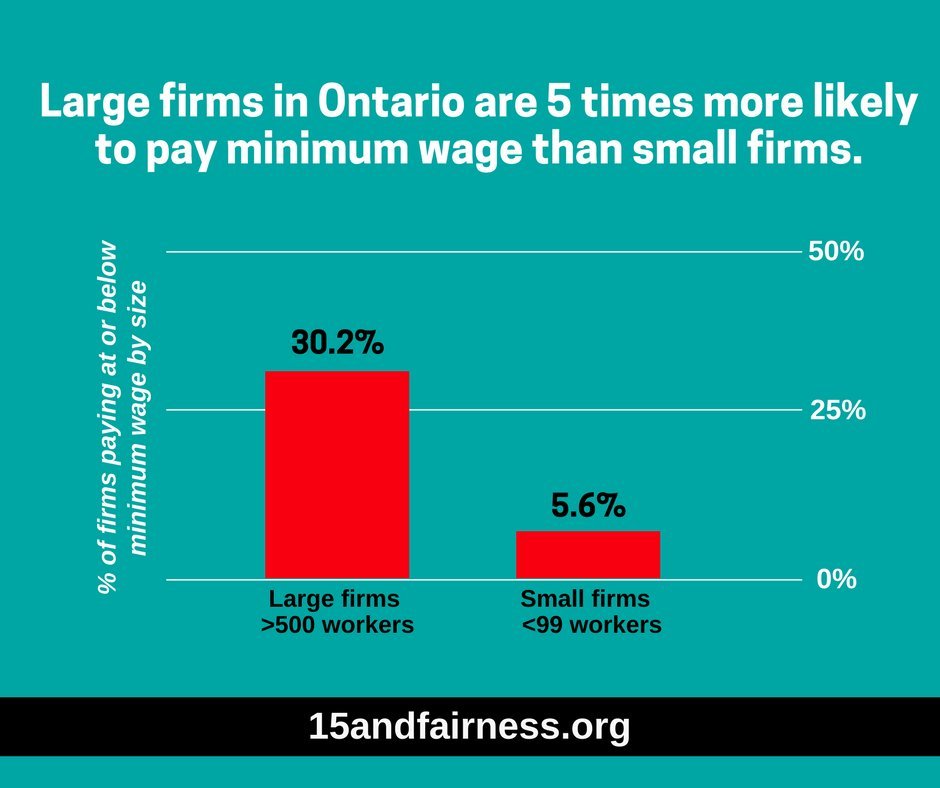
The biggest right-wing myths about raising the minimum wage, debunked
The combined weight of research, history, and economic expertise shows that giving low-wage workers a raise is a net positive.
Ontario workers may have won a huge victory in their fight for a $15/hour minimum wage, but the fight clearly isn’t over.
Last week, as a $14/hour minimum wage was phased in to mark the new year, low-wage workers across the province began to report clawbacks from bosses.
Workers tell CBC multiple Tim Hortons franchises and other businesses in Ontario are now cutting workers’ pay and benefits, citing Jan. 1 minimum wage hike: https://t.co/x5rGy15UEt
— CBC News Alerts (@CBCAlerts) January 5, 2018
Most infamously, the owners of a Tim Hortons franchise in Cobourg – who also happened to be the son and daughter of the chain’s founders – sent a letter to employees announcing a series of cutbacks to paid breaks and other benefits.
Basically saying “Let them eat donuts”! Cobourg, ON Tim Hortons franchise owner Ron Joyce Jr. (whose father’s net worth is US$1.4 billion) says $14 minimum wage necessitates unpaid breaks, employees covering 50-75% of their health benefit costs, and other cuts! #BoycottTimHortons pic.twitter.com/KbEPkWZSRv
— Brent Patterson (@CBrentPatterson) January 5, 2018
Let’s just say people weren’t impressed.
If you’re nickel-and-dime-ing your already impoverished employees from your winter home in Florida, that’s not market forces, that’s greed https://t.co/V28Aewn8BU
— Erika Thorkelson (@ethorkel) January 3, 2018
The enormous reaction to this column shows that people genuinely care about #MinimumWage, and are offended by #TimHortons and anybody else who acts thus. In other words, most Canadians believe in fairness and justice. https://t.co/UlNrFJxc3O
— Michael Coren (@michaelcoren) January 6, 2018
Give me a *PAID* break. Ontario employers are using the rise in the minimum wage to reduce the quality of work across this province. This is employers bullying workers. The OFL knows that Ontarians will come together and say #IStandWithTimHortonsWorkers. https://t.co/gQ4P5aMBxU pic.twitter.com/MCJyq66ICw
— Chris Buckley (@ChrisBuckleyOFL) January 5, 2018
BTW; I worked at a Tim Hortons. Then I did corporate legal work for a few Timmies franchisees as a legal secretary. And franchise owners who cry poverty over min wage hike aren’t being honest. Period. I’ve personally seen their profit margins. #ableg #cdnpoli https://t.co/7S9lydKNa5
— Kathleen Smith (@KikkiPlanet) January 5, 2018
The usual suspects and special interest groups, of course, rushed to pull an “I told you so” with Ontario’s minimum wage hike, in the process implying that clawbacks against low-wage workers were simply “economics”: the inevitable result of higher minimum wage policies rather than the unnecessary and greedy decisions of bosses.
To make matters worse, parts of the Canadian media also widely mishandled the reporting of a Bank of Canada study on the minimum wage, failing to lead with its most important conclusion: that the benefits of raising it outweigh any of its potential costs.
As recent history has shown, for some people there’s just never a good time to raise the minimum wage. And, as recent history has also shown, the doom and gloom predictions of right wing and business interests never quite seem to come true.
But, since there’s been so much misinformation in this debate, and because a few well-worn right wing talking points refuse to die, let’s tackle a few of the most nonsensical minimum wage myths once and for all.
“Raising the minimum wage will cause massive job losses and make everything more expensive”
Perhaps the favourite claim of people resistant to giving low-wage earners a raise is that upping the minimum wage automatically causes the economy to shed jobs.
Incidentally, the recent media-fueled panic over Ontario’s new minimum wage floor owed itself almost entirely to headlines like “Minimum wage hikes could cost Canada’s economy 60,000 jobs by 2019” (CBC) and “Wage hike could cost 60,000 jobs, Bank of Canada says” (Toronto Star).
But, as Michal Rozworski writes, the alarmism about this figure misses the mark:
“The Bank is not predicting 60,000 pink slips but merely a slowdown in continued job growth. The 60,000 figure is a national, annual one and represents just 0.3 per cent of total employment. Monthly job growth has at times exceeded this number [and] the Bank found that the costs of projected lower employment are outweighed by the benefits from higher economy-wide wage income stemming directly from the minimum wage increase.”
Contrary to the claims of organizations like the C.D. Howe Institute, Alberta’s 33% increase in the minimum wage between 2015 and 2017 hasn’t stopped it from creating tens of thousands of new jobs.
And what about a higher minimum wage suddenly making everything more expensive?
A 2011 University of California, Berkeley study estimated raising the minimum wage by approximately $5 would only lead to a 1.1% increase in the average Walmart shopper’s bill at the checkout line:
“Even if Walmart were to pass 100 percent of the wage increase on to consumers, the average impact on a Walmart shopper would be quite small: 1.1 percent of prices, well below Walmart’s estimated savings to consumers. This works out to $0.46 per shopping trip, or $12.49 per year, for the average consumer who spends approximately $1,187 per year at Walmart. This is the most extreme estimate, as portions of the raise could be absorbed through other mechanisms, including increased productivity or lower profit margins.”
Related studies of companies like McDonalds have reached similar conclusions, suggesting that any price increases from raising the minimum wage – should they even occur – are quite negligible.
“The people who earn the minimum wage are just affluent teenagers living at home”
The idea that many or even most people earning the minimum wage are just pampered youngsters working summer jobs for pocket money is, unfortunately, a still prevalent myth.
Indeed, right wing organizations like the Fraser Institute have painted the typical minimum wage earner as a “teenager or young adult aged 15-24” who lives “with their parents or other relatives.”

And they’ve taken it further: “There are many minimum-wage earners (such as teenagers) who come from affluent families,” a Fraser Institute report from 2016 states, “meaning middle- and upper-income people would receive some of the benefits” from “raising the minimum wage.”
But this caricature, well-worn as it is, simply doesn’t do justice to who the typical minimum wage earner really is.
For one thing, being above the Low-Income-Cut-Off (LICO) point – as many minimum wage earners technically are – doesn’t make you “affluent”.
Moreover, Statistics Canada’s 2015 Labour Force Survey suggests that less than one-third of all minimum wage workers in Canada are between 15-19 and live with their parents – hardly a majority. Moreover, the same data identified hundreds of thousands of minimum wage workers (41%) who are 25 or older and don’t exactly line-up with the caricature.

(And, as per the 2015 data, when you factor in workers only earning a dollar or so above the minimum wage, the plurality who are adults over the age of 25 gets even bigger.)
“It’s mainly small businesses that pay the minimum wage”
Opponents of raising the minimum wage like to conjure the image of small, family-owned shops in small towns struggling to afford paying out higher wages.
But, like the caricature of minimum wage earners as affluent teenagers, this image is largely out of sync with reality.
In fact, big firms in Ontario are five times more likely to pay workers the minimum wage than small ones.

Moreover, there’s plenty of research which suggests a higher minimum wage can actually benefit small businesses. Why? Because, broadly speaking, low-wage workers are also consumers who will reinvest in their communities when they shop or go to restaurants.
As former US Secretary of Labor Robert Reich puts it: “the real job creators are people with money in their pockets.”
A 2016 study by researchers at the University of Washington which looked at the effects of higher minimum wages in Seattle, among other things, concluded:
“We do not find compelling evidence that the minimum wage has caused significant increases in business failure rates. Moreover, if there has been any increase in business closings caused by the Minimum Wage Ordinance, it has been more than offset by an increase in business openings.”
Contrary to right wing predictions of doom and gloom, the bottom line is that raising the minimum wage puts more money in ordinary people’s pockets and reduces inequality.
Hopefully more provinces soon follow suit.
Our journalism is powered by readers like you.
We’re an award-winning non-profit news organization that covers topics like social and economic inequality, big business and labour, and right-wing extremism.
Help us build so we can bring to light stories that don’t get the attention they deserve from Canada’s big corporate media outlets.
Donate



